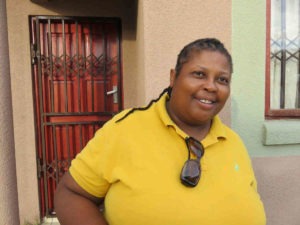Ndumie Funda
A self-proclaimed South African feminist, Ndumie Funda is the activist who founded Luleki Sizwe – a non-profit organisation based near Cape Town dedicated to supporting predominantly black lesbian women like herself, who are victims of rape or homophobic attacks. The organization was created after Funda’s friend Luleka Makiwane and fiancée Nosizwe Bizana were victims of ‘corrective’ rape and died as a result of the HIV they had contracted from their rapists.

The term ‘correctional rape’ was coined in South Africa and is a type of rape committed mainly against lesbians, in order to ‘cure’ them, make them ‘real women’ and ‘turn them straight’. This has become endemic in South Africa so much so it is estimated around 10 women a week are correctively raped (Koraan & Geduld, 2015) – the uncertainty of this number stems from the cultural shame that leads to an estimated 88% of rapes to go unreported (Human Rights Watch, 2011). The devastating nature of corrective rape make it one of the most brutal times, more often than not it is gang rape, and the women are likely to be left for dead afterwards (Strudwick, 2014). From 1998-2009 in South Africa there was 31 reported cases of lesbians murdered as hate crimes. Horrifyingly only one of these lead to a conviction (Mieses, 2009).
This is the very problem Ndumie Funda has tried to help, in memory of her friend and fiancée, and for all the other black lesbian women who are one of the most vulnerable groups in South African society. Funda’s most influential campaign was in 2010, when she started a petition on Change.org to attract the attention of the South African government on the issue of correctional rape. While initially the petition gained little traction, it gained almost 200,000 signatures, and was the largest petition ever on Change.org to that date. This forced the South African government to set up a meeting with Funda which consequently led to legislative change in 2014 – South Africa’s first ever law against hate crimes (Schroeder, 2015).
Whilst this monumental achievement sets Funda apart, the day-to-day work of Luleki Sizwe should not be forgotten for it is invaluable to these women who can often find little support from their community or even family, after these horrific discriminatory attacks. In South Africa, despite progressive legislation, there is still, especially rurally, a strong victim blaming and purity culture as well as rampant homophobia which results in victims of rape or members of the LGBT community being shunned from their communities or evicted from their homes.
In her hometown of Gugulethu, where women are expected to ‘know their place’ these patriarchal issues are particularly pronounced, and this is something Funda is fighting to change through talks and campaigns to raise awareness and educate members of the community on how to deal with and prevent these issues. Luleki Sizwe helps victims of other gender or sexuality-based incidents too, such as those living with HIV, those who struggle with unemployment and hunger, and/or those who turn to prostitution or drugs as a last resort.
Funda’s efforts as a black lesbian woman living in rural South Africa – a country plagued by sexual violence- makes her a hero to those she helps, who are given the chances, opportunity and support they would not otherwise be able to find. A valuable reminder to some of the world’s most vulnerable women that they are not alone.
The author
Sienna is a student at Wimbledon High School. Her fantastic profile of Ndumie Funda won the Key Stage 4 category of our 2021 ‘Personalities & Powers’ writing competition.